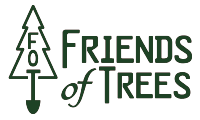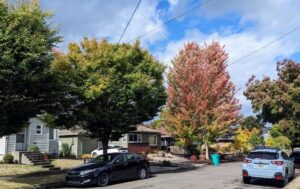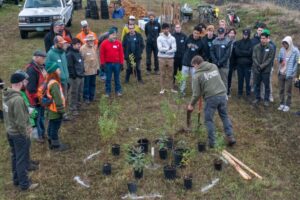Tag: equity
Save Our State’s Urban Trees from Tree Code Rollback
Governor Kotek’s HPAC proposes overriding tree codes in favor of development.
Governor Kotek’s Housing Production Advisory Council (HPAC) is currently planning to bring forward recommendations that include the overriding of tree codes for plots smaller than 6,000 square feet, which will explicitly allow clear cutting of trees under 48″ diameter, which includes the vast majority of urban trees. This recommendation stands in stark contrast to work taking place throughout the state and nation to increase tree cover as a key tool for growing climate-resilient cities. Read more here.
HPAC has a hearing on Friday, September 29th where this facet of their proposal will be discussed.
We recognize the urgent need for affordable housing, but housing and trees should not be mutually exclusive. Friends of Trees, the Shade Equity Coalition (we’re a member!), and many other environmental organizations around the state believe the proposal is unnecessarily pitting the housing and climate emergencies against one another. Unfortunately, this advisory body in question does not have a representative from the environmental justice sector to speak to shade equity, climate change, and the myriad of benefits urban trees provide to Oregonians. This is our chance to voice our concerns.
HOW TO TESTIFY
Since it is difficult to testify at the hearing itself, please make sure to submit written testimony to: [email protected] and copy [email protected].
Suggested Talking Points from Trees for Life Oregon
—At a time of climate crisis, throwing climate- and tree-related regulations out the window is a misguided, short-sighted way to speed up housing construction—and a sure way to guarantee that the state and its cities and towns will be unable to meet their own planned climate and canopy goals.
—Many factors affect developers’ ability to build more affordable housing faster. Tree protections are hardly key among them. Portland’s tree code gives developers the option of paying fees to remove trees in lieu of preserving them. Builders have been paying these fees as they do other business expenses, deeming them worth it in order to build more revenue-generating units or a larger single home whose price will more than cover any tree-removal fees they might have paid. Moreover, simply doing away with tree protections will not guarantee that builders will create more affordable housing.
—We oppose HPAC’s proposal to essentially override municipal tree codes like Portland’s that took many people many years and much effort to put into place. Tree codes were created to ensure Oregon remains a livable place we can all be proud to live in. The Portland tree code, for one, was in the end strongly influenced by developers and is already weak as is.
—We oppose HPAC’s recommendations to erode state and local wetland and environmental zone protections. Such changes will certainly impact trees.
—Governor Kotek’s HPAC is proposing to do away with environment regulations that developers have wanted to eliminate for years. When selecting HPAC’s members Governor Kotek did not include broader voices that would reflect the reality that we are facing both a housing and a climate crisis, and that both need to be addressed in an integrated way.
We hope you’ll take this opportunity to let your voice be heard.
Coalition Led by Friends of Trees Awarded $12M Community Forestry Grant
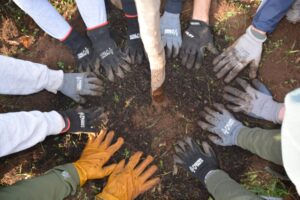
Friends of Trees | FOR IMMEDIATE RELEASE
For more information:
Friends of Trees: Yashar Vasef, Executive Director; [email protected]
Please contract coalition members for more information about their organization’s specific project role and activities (details below)
Portland, Ore. (9-14-23) — An 11-member coalition led by Friends of Trees was awarded a $12 million Urban and Community Forestry Grant from the U.S. Department of Agriculture as part of the Inflation Reduction Act grants. The grant will fund the engagement of low canopy neighborhoods included in the Biden-Harris Administration’s Justice40 initiative, which will bring resources to communities most impacted by climate change, pollution, and environmental hazards.
The partner coalition includes APANO, Black Parent Initiative, City of Gresham, City of Portland, Columbia Slough Watershed Council, Connecting Canopies, Depave, POIC, Verde, and Wisdom of the Elders. The $12 million award will direct funds to these partners and Friends of Trees across five years. This is a partial award, as the original request was for $17.5 million, and the details of the award have not yet been provided.
The coalition’s proposal includes funding for community forestry work including tree planting, natural area restoration, post-planting care, community education, opportunities for direct community input and participation, and workforce training.
“This award is a validation of community tree planting as a model,” says Friends of Trees Executive Director Yashar Vasef. “Especially in the face of intensifying climate change, authentic community partnerships have a huge part to play in growing and maintaining our urban forests.”
The project includes:
- community tree planting (training and engaging volunteers) to plant up to 2,300 street and yard trees and 21,000 native shrubs in neighborhoods and natural areas, specifically in identified equity areas: East Multnomah County, West Eugene, and Springfield
- robust post-planting care, including watering, mulching, and natural area maintenance
- community education
- opportunities for direct community input and participation
- workforce training
In addition to community tree planting and tree care, thousands of additional trees and native shrubs will be planted and cared for by coalition partners through other methods.
“This project represents a tremendous investment in growing our community’s canopy,” Vasef says. “That means engaging the community in efforts to both plant and care for trees.”
Agriculture Secretary Tom Vilsack announced that the USDA’s Forest Service is awarding more than $1 billion in competitive grants to plant and maintain trees, combat extreme heat and climate change, and improve access to nature. Friends of Trees’ partner application is one of 385 proposals that were accepted across the nation.
In addition to affirming the effectiveness of the community tree planting model, this award demonstrates that policymakers are listening to the science. It’s widely accepted that trees play a vital role in combating climate change and providing public health benefits. A recent study using 14 years of Friends of Trees planting data associates neighborhood tree planting with fewer deaths.
“This isn’t just the coalition’s award, this is our communities’ award,” says Vasef. “This coalition represents a broad, diverse cross section of our communities, and these communities will be directly involved with, and will directly benefit from, this project.”
~~~~~~~~~~~~~~~~~~~~~~~~~~~~~~~~~~~~~~~~~
Friends of Trees (FriendsofTrees.org)
Friends of Trees inspires people to improve the natural world around them through a simple solution: Planting Trees. Together.
Friends of Trees was founded in 1989 by a local community member who loved trees and started planting them in neighborhoods. Today, Friends of Trees is a nationally recognized, regional leader in improving the urban tree canopy and restoring sensitive natural areas—through programs delivered by thousands of volunteers. Friends of Trees has planted 945,000+ trees and native plants in neighborhoods and natural areas in six counties across two states in the 35 years since its founding. Learn more about The Friends of Trees Way.
Please contract coalition members for more information about their organization’s specific project role and activities:
- APANO: Duncan Hwang, [email protected]
- The Black Parent Initiative: Leigh Bohannon, [email protected]
- Columbia Slough Watershed Council: Max Samuelson or Heather King, [email protected]; [email protected]
- Connecting Canopies: Theresa Huang or Derron Coles, [email protected]; [email protected]
- Depave: Katya Reyna, [email protected]
- City of Gresham: Tina Osterink or Sarah Cagann, [email protected]; [email protected]
- City of Portland: Mark Ross, [email protected]
- Rosemary Anderson High School/POIC: Leigh Rappaport, [email protected]
- Verde: Jasmine Co or Amandeep Sohi, [email protected], [email protected]
- Wisdom of the Elders: Adrienne Moat, [email protected]
The 2023 Season Begins in Eugene
How the Eugene-Springfield team is starting the 2023 season
In Eugene and Springfield, Friends of Trees has been growing a robust community of tree stewards through their community pruning events. They’re about halfway through their slate of seven pruning events, each one with a small but mighty crew of pruners. By keeping these events intimate, each pruner gets plenty of hands-on experience.
“Young tree pruning is the most cost effective thing you can do for an urban forest,” says Eugene Director Erik Burke. “It’s a great experience for volunteers. We have a lot of regulars, and some new folks too.”
The Eugene Springfield team will kick off their season as they always do with another planting along Northwest Expressway on November 4th. This year will be the monumental Phase 10 of this planting project. It’s a prime example of putting trees in places where there’s plenty of room for trees and the benefits they provide. The team is able to plant large species, and also plant shrubs and bulbs to create a multi-level habitat for pollinators and wildlife. As each phase matures it does more and more to clean the air from the expressway and the railroad.
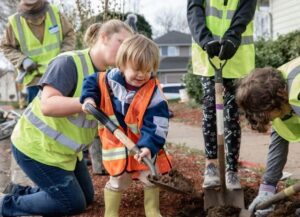
One of the most exciting things happening in Eugene this season will be the expansion of our equity work into high priority neighborhoods. With funding from an EWEB Greenpower Grant, the Bethel, Trainsong, and Far West neighborhoods will each get planting events, increased engagement, and more trees!
“We want to continue focusing our urban tree planting work on equity, sustainability, and resilience,” Erik says. “The Greenpower grant has allowed us to do even more.”
These are just a few of the exciting things happening for our Eugene Team this season. Stay tuned for when we dig in on these topics and more, and visit their event calendar here to join in on the fun!
The Eugene Branch’s Greenpower Grant
Expanding Equity and Sustainability Work with an EWEB Greenpower Grant
Eugene residents can support tree planting through Eugene Water and Electric Board’s Greenpower program. Residents can volunteer to donate one cent per kilowatt-hour toward funding environmental projects.
Friends of Trees is grateful to be a recipient of a Greenpower grant, which includes $50,000 over two years to plant trees in low income, high diversity neighborhoods that also have low canopy and high heat. As part of the effort to increase tree equity in Eugene, the trees are provided to residents for free through this program. We then engage treecipients in tree stewardship beyond the planting to ensure that the trees can have a sustained impact on their neighborhood.
“For just a penny for every kilowatt-hour, Eugene residents can help make their communities more sustainable,” said Cheryl Froehlich from EWEB to volunteers as she thanked them at the Friends of Trees’ Mangan Park planting event last month.
As part of this Greenpower grant funded work, Friends of Trees formed a productive partnership with members of the neighborhood association Active Bethel Community (ABC), City of Eugene, and local businesses.
When the neighborhood expressed interest in more street, yard, and park trees, we offered free street and yard trees to all neighborhood residents, and used equity mapping applications to choose two focus areas around neighborhood parks to do extra work. There, ABC residents went door to door to each house with a public planting space and talked to residents. Friends of Trees staff helped with site selection, questions and sign ups.
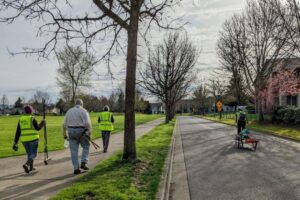
With funding from the Greenpower grant, the capstone of this year’s Friends of Trees work was putting on two planting events in West Eugene, in the Bethel neighborhoods around Gilbert Park and Mangan Park. To honor the mission of the grant and meet our own goals of increasing the sustainability of our events, we incorporated more bicycle crews. Both plantings had four bike crews and two carpool crews. We towed the gear and trees on bike trailers, and the volunteer planters either biked or walked from house to house.
Friends of Trees also hosted multiple free tree walks in each focus area park, and completed several additional smaller neighborhood plantings, tree walks, and community outreach events.
The City of Eugene made major contributions to the canopy in the same neighborhoods, with plantings in the focus area parks, pruning work in the neighborhood, and a major series of planting events on Highway 99, one of the main heat islands in Eugene.
“The pandemic, racial justice issues, and extreme heat of the last few years, have focused our urban tree planting work more intentionally on equity, sustainability, and resilience.” says Eugene Director Erik Burke. “The Greenpower grant has allowed us to expand this work.”
We are excited to use Greenpower grant funding to grow and improve our work in Bethel and expand the approach to Trainsong neighborhood for next planting season.
Tree Care + Equity
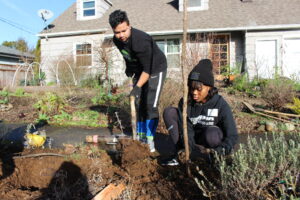 Most people by now are fairly well attuned to the benefits of trees environmentally, socially, mentally, and more. However, less people are aware of how tree canopy is distributed among a city and its neighborhoods.
Most people by now are fairly well attuned to the benefits of trees environmentally, socially, mentally, and more. However, less people are aware of how tree canopy is distributed among a city and its neighborhoods.
A trend across the country in large cities is that trees, and the benefits they bring, are distributed inequitably across neighborhoods based on race and income. Higher income neighborhoods with majority white residents have over 75% tree canopy coverage as compared to lower-income neighborhoods with around 15-30% canopy cover. These are large discrepancies that result in hotter environments, more air pollution, and factors contributing to respiratory conditions like asthma for children.
These trends are reality here in Portland: west Portland (excluding Forest Park) has about 75% canopy cover in most neighborhoods, while east Portland neighborhoods average about 15-30% canopy cover. Friends of Trees prioritizes planting street and yard trees in neighborhoods on the eastside of Portland to help decrease this disparity.
However, many people are wary about – if not outright opposed to – getting a tree of their own because of the costs of tree care, which can increase as a tree grows. This is just one of the reasons Friends of Trees provides tree care along with tree planting, including proper pruning of young trees at no cost to the property owner. And we’re exploring ways to increase the availability of low to no cost tree care for folks who need it, because we know the benefits of trees far outweigh the costs.
In the City of Portland, tree care and maintenance costs are the responsibility of the tree’s adjacent property owner. This is an inequitable financial burden for low-income households, renters, and populations vulnerable to gentrification. Many communities of color cite the financial burdens that a mature tree can bring as a reason to not want to plant trees next to their houses. It’s important to address these very valid concerns since trees have so many benefits, which is why Friends of Trees is continually working on creating programming that is responsive to community needs; in fact, we have funding proposals pending with Portland’s Clean Energy Fund that would help subsidize costs of mature tree care so we can grow our already considerable post-planting tree care services.
Understanding concerns about tree care
In 2018, Friends of Trees partnered with APANO and LARA Media to conduct three focus groups toward better understanding how community members viewed neighborhood trees and tree planting efforts. To increase accessibility these focus groups were conducted in multiple different languages including Vietnamese, Mandarin, and Spanish. Overall, many community members cited the benefits of trees within the city, including their health and environmental benefits:
“Trees are good for the lungs. They are the lungs of the city.”
“In the city, there’s big trees that make the air cooler. It also makes the city greener.”
–participants from the Vietnamese focus group
However, when asked if there are barriers for them to plant trees, many community members cited the long-term costs associated with mature tree care. One participant said: “One of the negatives is that sometimes Portland has a lot of storms and trees fall down when there’s strong wind. I experienced that once. The tree can fall into the house and collapse the house. Usually I try to hire a professional to cut the tree, but it [can cost] thousands of dollars. The tree bothers us.”
Trees and access to the natural environment are integral to healthy, livable neighborhoods. The benefits trees bring are strongest when they are mature, at least 10-15 years after they are planted. However, the fears community members have about the costs trees may bring are also valid, especially since the median household income on the eastside of Portland is lower and there are fears of being pushed out.
Friends of Trees is committed to equitably growing the urban forest through community-centered tree plantings. We offer tree care for the first three years of a tree’s life after it’s planted, including affordable (or free if cost is a prohibiting factor) summer watering service; free mulch; and structural pruning provided at no cost (see the next story for more about our pruning program). Structural pruning on a young tree is vital for its long term health, and can help prevent limbs falling onto a house or car later on in its life, since we can prune for the built environment and the tree will grow into that structure.
However, Friends of Trees also recognizes there are long term costs and concerns that need more support within our communities to make sure the urban forest is distributed equitably. We are continually working on creating programming that is responsive to community needs and when the opportunity arises we pursue grant funding to help subsidize costs of mature tree care. Because we know that, all in all, the positives of trees far outweigh the negatives; as our good friends at J Frank Schmidt like to say, “Trees are the answer.”
Photo: Street tree planting in east Portland, January 2020.
